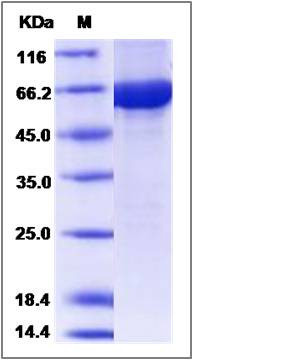Human Cbl-c / CBL-3 Protein (His & GST Tag)
CBLC, CBL3, RNF57
- 100ug (NPP1978) Please inquiry
| Catalog Number | P15659-H20B |
|---|---|
| Organism Species | Human |
| Host | Baculovirus-Insect Cells |
| Synonyms | CBLC, CBL3, RNF57 |
| Molecular Weight | The recombinant human CBLC chimera consists of 711 amino acids and has a calculated molecular mass of 80.2 kDa. The recombinant protein migrates approximately 66 kDa band in SDS-PAGE under reducing conditions. |
| predicted N | Met |
| SDS-PAGE |  |
| Purity | > 95 % as determined by SDS-PAGE |
| Protein Construction | A DNA sequence encoding the human CBLC (AAH28915.1) (Met1-Ala474) was expressed with the N-terminal polyhistidine-tagged GST tag at the N-terminus. |
| Bio-activity | |
| Research Area | Neuroscience |Sensory System |Auditory system |
| Formulation | Lyophilized from sterile 20mM Tris, 500mM Nacl, 10% glycerol, pH 8.0. 1. Normally 5 % - 8 % trehalose and mannitol are added as protectants before lyophilization. Specific concentrations are included in the hardcopy of COA. |
| Background | CBL proteins, such as Cbl-c, are phosphorylated upon activation of a variety of receptors that signal via protein tyrosine kinases. Through interactions with proteins containing SRC homology-2 (SH2) and SH3 domains, CBL proteins modulate downstream cell signaling. Cbl-c is a member of the Cbl family of E3 ubiquitin ligases. Expression of Cbl-c gene may be restricted to epithelial cells, and alternatively spliced transcript variants encoding multiple isoforms have been observed for Cbl-c gene. |
| Reference |
